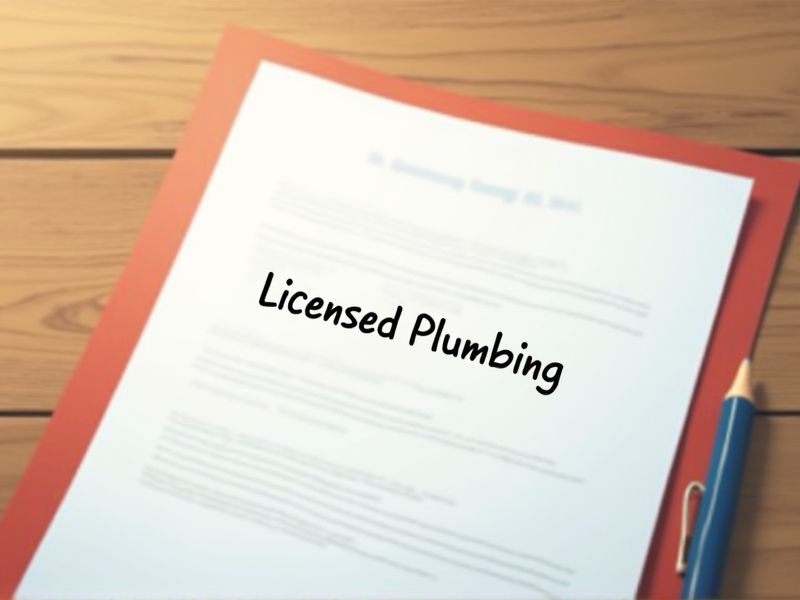
Licensed plumbers require certain certifications to ensure their skills meet industry standards and regulations, which directly impacts safety and code compliance. Certifications validate a plumber's expertise in areas like pipe fitting, water filtration, and gas systems, thereby enhancing their credibility and employability. Without these certifications, plumbers may face limitations on the types of work they can legally perform, constraining their professional opportunities. Key certifications in the plumbing field include foundational credentials necessary for licensed practice.
State Plumber License
Plumbers require a state license to ensure they adhere to standardized safety and technical guidelines, preventing hazardous installations. Licensing verifies a plumber's competency and knowledge through examinations, creating a trustworthy professional pool. Consumers gain confidence in knowing licensed plumbers are accountable to state boards, reducing the risks of unqualified workmanship. Licensing fosters consistent updates on codes and practices, facilitating the plumber's continued education and professional development.
Journeyman Plumber Certification
Obtaining the Journeyman Plumber Certification demonstrates a plumber's competence and skill level, often required by state regulations to ensure public safety. The certification process equips plumbers with the necessary knowledge of plumbing codes and best practices, minimizing potential hazards. Employers and clients usually trust certified journeyman plumbers more, which increases job opportunities and earning potential. Holding this certification is often a prerequisite for advancing to a master plumber level, allowing for more complex work and responsibilities.
Master Plumber Certification
Master Plumber Certification provides advanced technical knowledge and skills, enhancing a plumber's expertise beyond the foundational level. This certification often leads to increased job opportunities and higher earning potential, as it signifies a higher level of competency. Many jurisdictions require this certification for certain complex plumbing tasks and to operate independently as a plumbing contractor. Having a Master Plumber Certification can instill greater trust and credibility with clients, ensuring adherence to best practices and regulations.
OSHA 10-Hour Construction Safety Certification
The OSHA 10-Hour Construction Safety Certification is needed for licensed plumbers because it enhances their awareness of potential job site hazards and methods to mitigate them. Plumbers encounter various risks, such as exposure to hazardous materials and working in confined spaces, requiring knowledge to ensure personal and public safety. Many states and employers mandate this certification to comply with legal safety standards and reduce the likelihood of workplace accidents. The certification helps plumbers stay updated with industry safety protocols, fostering a culture of safety within the construction industry.
EPA Section 608 Certification
EPA Section 608 Certification is necessary because it ensures that a licensed plumber is knowledgeable about handling refrigerants safely and legally, which is crucial for preventing environmental harm. Plumbers working on HVAC systems that contain ozone-depleting substances must comply with the Clean Air Act to avoid legal penalties. Obtaining this certification demonstrates the plumber's competence in reducing refrigerant emissions, thereby contributing to environmental conservation. Employers and clients often require this certification as a guarantee of the plumber's capability to follow federal regulations.
Backflow Prevention Certification
Backflow prevention certification ensures plumbers possess the knowledge to protect water supplies from contamination. This certification establishes a plumber's capability to install and maintain systems that prevent backflow, mitigating health risks. Regulatory compliance in many regions mandates certified backflow prevention to uphold public safety standards. The demand for certified plumbers often arises from municipal requirements for safeguarding community water systems.
Plumbing Code Compliance Certification
Plumbing code compliance certification ensures that licensed plumbers adhere to established safety and quality standards, minimizing the risk of waterborne diseases and structural damage. The certification process often includes rigorous training and examinations, fostering a high level of proficiency and expertise among professionals. Moreover, non-compliance can lead to legal repercussions and increased repair costs over time, making certification a preventive measure. This certification reassures clients and regulatory bodies that plumbing work meets the necessary regulations, maintaining public trust and safety.
Gas Fitter Certification
A gas fitter certification is needed for licensed plumbers to ensure they have the expertise to handle gas systems safely, reducing the risk of leaks or explosions. Regulatory bodies require certification as a standard to maintain public safety and consistent quality in gas system installations. Certified plumbers can legally work on gas-related tasks, expanding their service offerings and potential income opportunities. The certification process also instills confidence in clients, knowing their plumbing professional is qualified to manage gas installations or repairs.
CPR and First Aid Certification
Licensed plumbers often encounter emergency situations that require immediate intervention. Having CPR and First Aid Certification equips them with the skills to respond effectively to workplace injuries or health emergencies. This certification can potentially reduce the severity of incidents and improve outcomes before professional medical help arrives. Employers and clients may prioritize plumbers with such certifications, valuing safety and preparedness.
Lead Safe Certification
Exposure to lead can cause significant health problems, particularly in young children and pregnant women, underscoring the need for Lead Safe Certification for plumbers who frequently manage old pipes potentially containing lead. Federal regulations mandate lead-safe practices in renovation, repair, and painting, requiring compliance to avoid legal repercussions and ensure public safety. Certified plumbers demonstrate proficiency in safely handling lead-related hazards, fostering trust among clients and reducing the risk of lead poisoning. Certification also positions plumbers competitively in the industry by meeting the increasing demand for environmentally conscious and health-focused service providers.
Summary
When you hire a licensed plumber with additional certifications, you can expect higher standards of service and expertise. Their training equips them with specialized skills, ensuring quicker and more accurate problem resolution. Certified plumbers often stay updated with the latest industry standards and technologies. Consequently, this can result in fewer future issues and enhanced overall satisfaction with their work.
